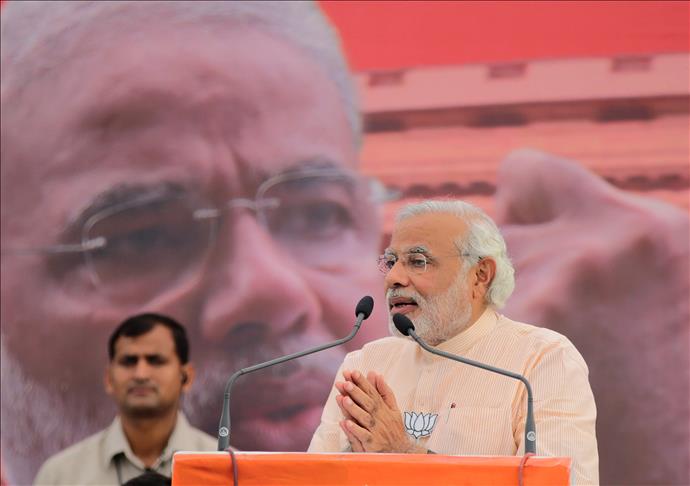
By Mubasshir Mushtaq
NEW DELHI
In 2011, when a group of broom-wielding activists launched the anti-corruption Aam Aadmi Party in India’s capital, many analysts dismissed them as a group of agitators who will bring "anarchy" into the political boardroom.
On Tuesday, four years later, the party, whose name translates as the Common Man’s Party, trounced the ruling Bharatiya Janata Party of Prime Minister Narendra Modi in Delhi elections, winning 67 of 70 seats.
Bharatiya Janata Party, which bagged 31 seats in the November 2013 Delhi election, was reduced to only the remaining three seats. The Congress party, which had ruled Delhi for the past 15 years, did not get a single representative elected.
Tuesday’s historic mandate sent shockwaves throughout the country with some calling it a political tsunami; it was a verdict more spectacular than Modi’s general election victory in May 2014, in which the BJP won 282 seats out of 545.
“No party in Indian elections has ever won this huge landslide victory. It comes to over 95 percent,” Juzar Bandukwala, a retired professor and civil right activist, told Anadolu Agency.
The Aam Aadmi Party is led by 46-year-old former bureaucrat Arvind Kejriwal, who will take oath as Delhi’s youngest chief minister on Saturday.
Bandukwala said that the electoral mandate represents Indian voters' deep concerns on three issues: crony capitalism, the stridency of right-wing Hindu nationalist groups and Modi’s behaviour during U.S. President Obama’s India trip, when he wore an ostentatious suit with his name stitched on it, which reportedly cost over $15,000.
“Modi government is ran by few big corporates, who have benefited immensely in these eight months of his prime ministership. That is dangerous,” Bandukwala said. “The [Hindu nationalist group] RSS fringe has crossed all limits of decency. Muslims are obviously very disturbed. But most Hindus are also uneasy as it violates the essentials of Hinduism.”
Tanvi Rustagi, a Delhi resident and director of Delhi-based film festival, told Anadolu Agency she had voted for the Bharatiya Janata Party but because she supported their chief ministerial candidate, not their politics.
“I am sad that Aam Aadmi Party has won as I voted for Kiran Bedi, though I don’t like the BJP,” said Rustagi. “As a woman, I voted for Kiran Bedi given the key issue of women’s safety in the national capital.”
“I personally don’t like Modi as I am sceptical about his background,” she said, adding that she was against the use of religion in public life. “Instead of doing a sincere political campaign, the BJP was canvassing the party like a marketing strategy.”
- A referendum on Modi
Some believe that the Delhi election was actually a referendum on Modi's performance as India's prime minister.
Among them is Rakesh Sharma, a filmmaker who won awards for a documentary of 2002 inter-communal riots in the state of Gujarat which killed up to 2,000 people, mostly Muslim, while Modi was the state's chief minister.
“The landslide victory is a referendum on Modi. Everything flows from that,” Sharma said. “The aura of invincibility surrounding Modi and BJP president Amit Shah has been demolished.”
Bandukwala agrees, saying that Modi and his supporters had been eager to win the election.
“Modi addressed four public meeting in the city. He ordered 25 federal ministers and 120 federal lawmakers to campaign. At one stage there were about 200,000 BJP and RSS workers campaigning in Delhi. This was huge attack and it failed totally,” Bandukwala said.
He added that they made a mistake in making personal attacks on Kejriwal, whose anti-corruption campaign is considered to follow on from the work of Gandhi.
“Most important Kejriwal and his friends had done their homework perfect. They concentrated on issues instead of personal attacks on their opponents,” he said.
Sharma suggested the Delhi elections are an insight into national thinking, as the capital represents India and its microcosm.
“The city has extended families who are deeply disenchanted with the Modi government,” Sharma said. “People are no longer willing to wait to see the results on the ground. They want instant gratification.”
According to Sharma, 120 million first time voters, whom he calls the "young aspirational bloc", voted for the Bharatiya Janata Party in the 2014 parliamentary election, believing in Modi’s promise of a resurgent India, but that after eight months, they are "restless and impatient."
“They were sold the dream of a resurgent India and a free economy. But the right-wing groups attached with the BJP want Hindu women to have four children,” he said, referring to controversial comments made by an MP. “This chasm will sharpen and widen in coming months as the BJP can’t stay away with its DNA.”
On the other hand, Rustagi is apprehensive about some of the promises made by the Aam Aadmi Party.
“I am put off by Kejriwal’s tokenism and promise of free water and subsided electricity,” Rustagi said. “Does that mean I will have to pay more taxes?”
“I hope Kejriwal understands that throwing freebies affects others,” she said.
Anadolu Agency website contains only a portion of the news stories offered to subscribers in the AA News Broadcasting System (HAS), and in summarized form. Please contact us for subscription options.




